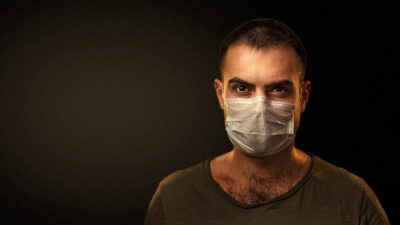Individuals diagnosed with COVID-19 can experience an array of symptoms,  from aches, fever, and chills, to loss of taste and smell, fatigue, and upset stomach. What’s more, while some symptoms are severe and life threatening, others report having no symptoms at all. Then there are those who experience longer-term symptoms like difficulty concentrating, continued headaches, and even hair loss.
from aches, fever, and chills, to loss of taste and smell, fatigue, and upset stomach. What’s more, while some symptoms are severe and life threatening, others report having no symptoms at all. Then there are those who experience longer-term symptoms like difficulty concentrating, continued headaches, and even hair loss.
In a survey of 3,900 survivors conducted by Survivor Corps, a COVID-19 support group, over 30% of respondents reported hair loss, a symptom that was reported more frequently than sore throat and nausea.
COVID-19 and Hair Loss
While health experts continue to learn about the novel Coronavirus, many believe the emotional and physical toll that COVID-19 exacts may be responsible for the hair loss that occurs in the weeks and months following contracting the disease. In fact, anything that disturbs the hair growth cycle or damages the hair follicle can cause hair loss.
Common Hair Loss Causes
Most people shed between 50 and 100 hairs each day. But because the average person has between 80,000 and 120,000 hairs on their head, this daily loss is barely noticed. Hair that is lost beyond the norm can be caused by a few different factors:
- Genetic male or female pattern hair loss, or androgenic alopecia
- Traction alopecia which is caused by hair that is repeatedly pulled a certain way over time, such as a tight ponytail or braid
- Alopecia areata which causes hair to fall out in small clumps resulting in bald patches
- Scarring alopecia which can be associated with autoimmune disease, among other causes
- Telogen effluvium – hair loss related to physical or emotional stress such as
- Major surgery
- Childbirth
- Miscarriage
- Major weight loss or dietary restrictions
- Certain medications
- Severe illness, including infection with high fever
- Stressful life events
What You Can Do
If you have been diagnosed with COVID-19 and are experiencing obvious hair loss, here are a few tips to help manage the situation:
- Try not to panic. Focus on your recovery. As stressful as it might be, know that it is perfectly normal to experience hair loss or excessive shedding after an emotionally or physically stressful time. Eventually, the shedding will stop, and your hair should return to its normal life cycle.
- Adjust your diet. Iron, vitamin D, and biotin are essential building blocks that aid in repairing damaged hair. Chicken, turkey, spinach and beans are good sources of iron. Vitamin-D fortified cereals and milk plus fatty fish contain goo amounts of vitamin D. And eggs, salmon, and organ meats supply biotin.
- Consult your doctor. Talk to your doctor about your hair loss and any other scalp symptoms you may be experiencing. While a dermatologist typically treats hair loss, a primary care physician may order blood work or other tests to rule out other underlying causes.
- Be on the lookout for other “weird” symptoms even after you’ve recovered from COVID-19 and those findings with your share with your doctor. Doing so will help the healthcare community as they continue to study the virus.
Regardless of what the cause might be, don’t let accelerating hair loss keep your sprits down and out. Instead, contact DiStefano Hair Restoration Center to request a free consultation. Starting then, we can put you back on the path toward a full head of hair.


